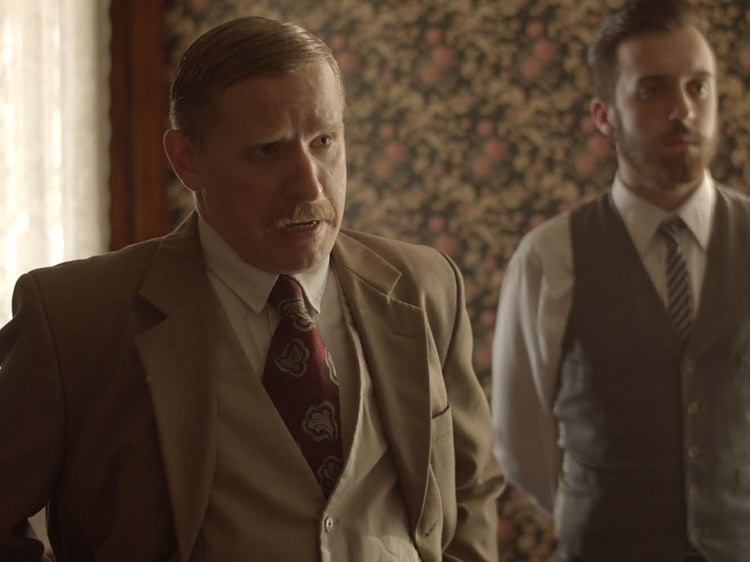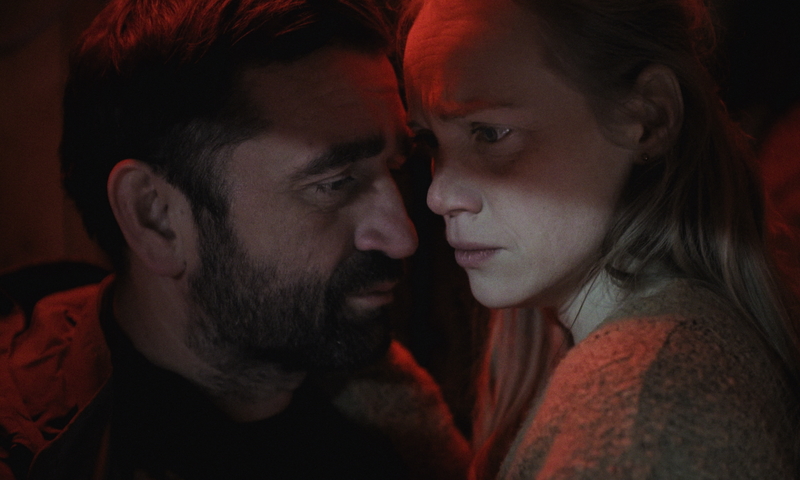
A Confrontation Between Poetry and Political Indifference
MOVIE REVIEW
Paul Laurence Dunbar: An American Poet
–
Genre: Short, Drama, Historical
Year Released: 2021
Runtime: 10m
Director(s): Kane Stratton
Writer(s): Kane Stratton
Cast: A. Slate, Timothy J. Cox, MyJoy Filer, Tanner James Brown
Where to Watch: available now, here: https://vimeo.com/563921576
RAVING REVIEW: PAUL LAURENCE DUNBAR: AN AMERICAN POET is a compact but potent short film that dramatizes one of America’s most overlooked voices at a time when those words were desperately needed. Written and directed by Kane Stratton, the 10-minute drama reconstructs a moment from 1903 Dayton, Ohio, in which Dunbar, one of the first influential Black poets in American literature, stands against the incomplete promises of the Emancipation Proclamation forty years after it was signed. With a small cast and contained setting, the film succeeds in amplifying the timeless urgency of Dunbar’s call for compassion and sympathy.
At the heart of the film is A. Slate’s portrayal of Paul Laurence Dunbar. Slate commands attention with a voice that blends indignation and resolve—with a performance grounded in authenticity, embodying Dunbar as both poet and social conscience. Rather than slipping into the role of a historical figure preserved in textbooks, Slate makes Dunbar immediate and alive, demanding an audience not only in 1903 but in the present day.
Timothy J. Cox plays Mayor Charles D. Snyder, a man representing the uneasy balance between recognition and resistance in a racially divided America. His exchanges with Dunbar are tense, with a guarded hostility that nonetheless leaves room for glimpses of humanity. Cox resists caricature, opting instead for subtlety, portraying Snyder as someone trapped by the prejudices and structures of his era yet not entirely immune to Dunbar’s insistence on dignity and justice.
MyJoy Filer as Matilda Dunbar, Paul’s mother, injects warmth and sorrow, reminding viewers that behind every cultural icon is a human story rooted in personal bonds. Tanner James Brown as Fitzgerald Roe rounds out the ensemble, embodying the era’s cautious pragmatism. Together, the four actors deliver a chamber piece that feels both theatrical in its dialogue-driven staging and cinematic in its close focus on character detail.
Stratton directs with restraint, using limited space and modest production design to emphasize language over spectacle. The film unfolds almost like a single-act play, prioritizing Dunbar’s words and their resonance. The camera lingers long enough to absorb performances, giving weight to silences as much as speeches. It is a style well-suited to the subject matter, turning what could have been a simple historical reenactment into a meditation on the endurance of words.
Thematically, the short underscores America’s ongoing struggle to live up to its ideals. The Emancipation Proclamation had legally ended slavery, yet systemic inequality and racial injustice persisted (and unfortunately, it’s still as timely as ever with an administration that’s trying to take the country back before.) By situating Dunbar’s voice in this gap between promise, the film makes its framework feel contemporary. The language of compassion and sympathy, invoked as essential virtues, serves as a poignant reminder of their continued absence in modern society. This resonance is the film’s greatest achievement: a work of history that refuses to remain in the past.
What works best is the balance between intimacy and universality. The setting is small, the runtime brief, yet the emotions and ideas carry beyond the screen. Slate’s delivery of Dunbar’s verse — particularly the invocation of “I know why the caged bird sings,” which would later inspire generations — ripples outward with a force that contradicts the film’s scale. It is a film about a poet, but also about poetry as an act of defiance, a means of speaking truth to power when politics and prejudice conspire to silence.
Stratton’s choice to frame the film around dialogue, supported by restrained visuals and performances, proves effective. There is no reliance on melodrama or heavy-handed cues. Instead, the film places trust in its words, in the conviction of its actors, and in the enduring relevance of a poet’s call for humanity. This confidence allows PAUL LAURENCE DUNBAR: AN AMERICAN POET to rise above the potential trappings of historical shorts that often reduce themselves to reenactment.
The film stands as a tribute not only to Dunbar’s life but also to the power of art as a form of resistance. It reminds us that words matter — that poetry, far from ornamental, can serve as a weapon against injustice and a soothing for fractured societies. Slate’s Dunbar embodies this conviction with gravitas, while Cox’s performance prevents the conflict from becoming one-dimensional. Together, they craft a story that resonates well beyond its modest runtime.
PAUL LAURENCE DUNBAR: AN AMERICAN POET may be brief, but it holds its own. It asks audiences to reflect on what has changed since Dunbar’s time, and perhaps more painfully, what has not. In ten minutes, it accomplishes something many features fail to achieve: it captures a moment, expands it into a message, and leaves the viewer questioning the distance between who we are and who we aspire to be.
Please visit https://linktr.ee/overlyhonestr for more reviews.
You can follow me on Letterboxd, Instagram, Twitter, and YouTube. My social media accounts can also be found on most platforms by searching for 'Overly Honest Reviews'.
I’m always happy to hear from my readers; please don't hesitate to say hello or send me any questions about movies.
[photo courtesy of CAESAR'S FORD THEATRE, D5 PICTURES]
DISCLAIMER:
At Overly Honest Movie Reviews, we value honesty and transparency. Occasionally, we receive complimentary items for review, including DVDs, Blu-rays, CDs, Vinyl Records, Books, and more. We assure you that these arrangements do not influence our reviews, as we are committed to providing unbiased and sincere evaluations. We aim to help you make informed entertainment choices regardless of our relationship with distributors or producers.
Amazon Affiliate Links:
Additionally, this site contains Amazon affiliate links. If you purchase through these links, we may receive a commission. This affiliate arrangement does not affect our commitment to honest reviews and helps support our site. We appreciate your trust and support in navigating these links.



Average Rating